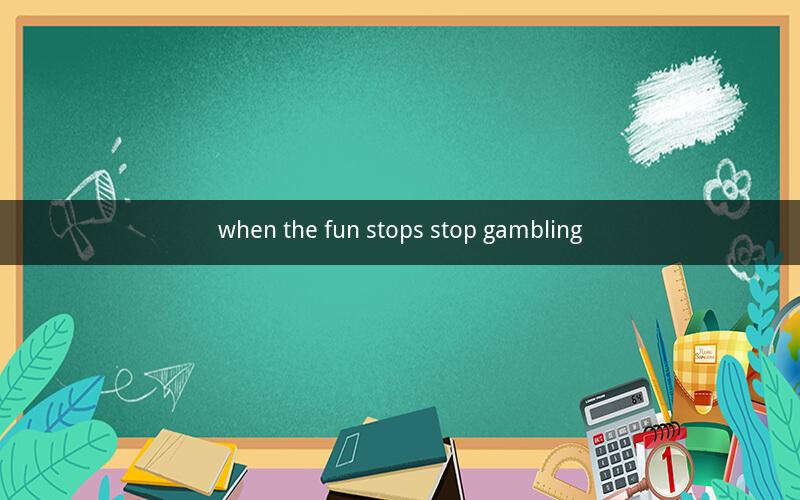
Table of Contents
1. Understanding the Concept of Problem Gambling
2. Signs and Symptoms of Problem Gambling
3. The Psychological Impact of Problem Gambling
4. The Social and Economic Consequences
5. Strategies for Stopping Problem Gambling
6. Seeking Professional Help
7. Support Groups and Community Resources
8. The Role of Technology in Problem Gambling
9. Legal and Ethical Considerations
10. Personal Stories and Testimonials
---
1. Understanding the Concept of Problem Gambling
When the fun stops, the reality of problem gambling sets in. Problem gambling, also known as gambling disorder, is characterized by an inability to control the urge to gamble, despite negative consequences. It is a complex condition that affects individuals of all ages, backgrounds, and socioeconomic statuses.
2. Signs and Symptoms of Problem Gambling
Identifying problem gambling can be challenging, as it often starts as a recreational activity. However, there are several signs and symptoms to look out for, including:
- Spending more time and money on gambling than intended
- Feeling restless or irritable when not gambling
- Using gambling as a way to cope with stress or negative emotions
- Lying to family and friends about gambling activities
- Missing work or school due to gambling
- Borrowing money to fund gambling activities
3. The Psychological Impact of Problem Gambling
Problem gambling can have severe psychological consequences, including depression, anxiety, and substance abuse. It can also lead to feelings of guilt, shame, and hopelessness. Understanding the psychological impact of problem gambling is crucial for those seeking to overcome it.
4. The Social and Economic Consequences
The social and economic consequences of problem gambling are far-reaching. It can strain relationships, lead to financial ruin, and even result in homelessness. Additionally, problem gambling can have a negative impact on communities, as it can lead to increased crime rates and decreased public services.
5. Strategies for Stopping Problem Gambling
Stopping problem gambling requires a multifaceted approach. Some effective strategies include:
- Setting a budget for gambling activities and sticking to it
- Taking breaks from gambling
- Avoiding triggers that may lead to gambling
- Seeking support from friends, family, or professionals
6. Seeking Professional Help
For many, seeking professional help is the first step in overcoming problem gambling. Therapists, counselors, and addiction specialists can provide personalized support and guidance. Treatment options may include cognitive-behavioral therapy, medication, and support groups.
7. Support Groups and Community Resources
Support groups, such as Gamblers Anonymous, can provide a sense of community and understanding for those struggling with problem gambling. Community resources, such as counseling services and financial assistance programs, can also help individuals overcome their gambling addiction.
8. The Role of Technology in Problem Gambling
Technology has both positive and negative impacts on problem gambling. While it can provide access to support groups and resources, it can also make gambling more accessible and convenient. Understanding the role of technology in problem gambling is essential for developing effective strategies to combat it.
9. Legal and Ethical Considerations
Legal and ethical considerations play a significant role in addressing problem gambling. Governments and organizations must balance the need for regulation with the desire to protect individuals from the harmful effects of gambling. This includes implementing responsible gambling policies and ensuring that gambling activities are conducted ethically.
10. Personal Stories and Testimonials
Personal stories and testimonials can be powerful tools in raising awareness about problem gambling. Sharing the experiences of those who have overcome their addiction can inspire others to seek help and take steps towards recovery.
---
Questions and Answers
1. Q: What is the difference between problem gambling and gambling addiction?
A: Problem gambling is characterized by an inability to control the urge to gamble, while gambling addiction is a more severe form of problem gambling that leads to significant negative consequences.
2. Q: Can problem gambling be cured?
A: While there is no guaranteed cure for problem gambling, it can be effectively managed and overcome with proper treatment and support.
3. Q: Are there any medications that can help treat problem gambling?
A: Yes, certain medications, such as antidepressants and mood stabilizers, may be prescribed to help manage the symptoms of problem gambling.
4. Q: How can I tell if someone I know is struggling with problem gambling?
A: Look for signs such as increased time spent on gambling, financial difficulties, and changes in behavior or mood.
5. Q: Are there any support groups available for problem gamblers?
A: Yes, organizations such as Gamblers Anonymous offer support groups for individuals struggling with problem gambling.
6. Q: Can technology help or worsen problem gambling?
A: Technology can both help and worsen problem gambling, depending on how it is used and the individual's vulnerability to gambling.
7. Q: What role does the government play in addressing problem gambling?
A: The government can implement regulations, provide funding for treatment and support services, and raise awareness about the dangers of problem gambling.
8. Q: Can problem gambling lead to other mental health issues?
A: Yes, problem gambling can contribute to mental health issues such as depression, anxiety, and substance abuse.
9. Q: How can I help a friend or family member who is struggling with problem gambling?
A: Offer support, encourage them to seek professional help, and be patient and understanding throughout their journey towards recovery.
10. Q: Is it possible to prevent problem gambling?
A: Yes, by promoting responsible gambling practices, raising awareness about the risks, and providing education, it is possible to prevent problem gambling.